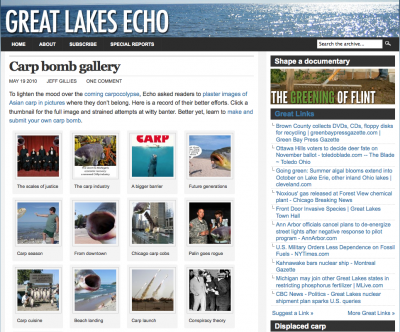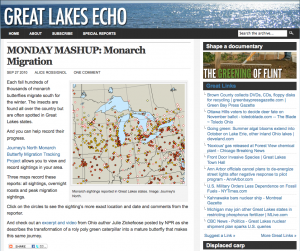Is there such a thing as a news shed that is congruent with a watershed?
“We define our community, the Great Lakes watershed, like hydrologists or geologists,” says Dave Poulson, founder of Great Lakes Echo. It covers eight states, two provinces and two nations, including Canada, of course.
Poulson, who is also associate director of the Knight Center for Environmental Journalism, initially used New Voices funding to launch GreatLakesWiki.org. Not happy with the community engagement on that site, he spun it into Great Lakes Echo.
“Engaging readers is why your online news community exists,” he declares. Otherwise, “you might as well publish a newspaper.” So if you build it and they don’t come, what do you do? Just wait?
His advice: Poke ‘em with some sharp sticks and challenge your community to interact. Among his ideas, to date are:
Carp Bombs. Use humor – invite people to photoshop images of the Asian carp, the invasive species terrorizing the lakes, into funny photos for the site’s Carp Bomb Gallery.
Facebook Quizzes. Stir the puckish side of your audience with provocative questions.
Which Great Lake are you? Lake Superior? Hmm… that would be cold, inaccessible and, well, superior, Poulson says.
Which Great Lakes invasive species is your former significant other? “My ex is definitely an Asian carp. He’s huge, gross-looking, and he frequently pops up when I least expect him too. I wish there was an electric fence to keep him away from Michigan,” said one respondent.
MapMashups. Entice readers to visualize what’s happening to your area with maps. Every Monday, the site either creates or finds a map that tracks such things as factories spewing pollutants or opportunities to count frog populations.
Poulson has learned to take advantage of satellite maps that point out such things as algae blooms or sediment seepage. “You can see sediment swirling … you can see where the mud comes from,” he marvels. “That huge regional community I’m trying to build – if you get far enough in outer space you can see that community.”
“I would argue: Is it journalism? Is it education? I don’t really care,”
He’s been nurturing a community of “satellite nerds,” urging them to post their images. “We tell mapmakers this is a resume builder for them.”
“I would argue: Is it journalism? Is it education? I don’t really care,” he says.
The site also finds stories that no one else is doing. For instance, it looked at power plant pollution, but from its effect on the water, not from the air. When General Motors filed for bankruptcy, the site examined the contaminated sites GM left behind.
Poulson, too, is looking for future support. So far, he has received a $10,000 grant from the Great Lakes Fisheries Trust. Initially he was hesitant to seek government funding, “but now I’m going after it.”
He sees an important opportunity to piggyback on government-funded environmental research projects that are required to have a public outreach component. “I’m saying: Build me into your grant application.”


